#Right to Vote
Text
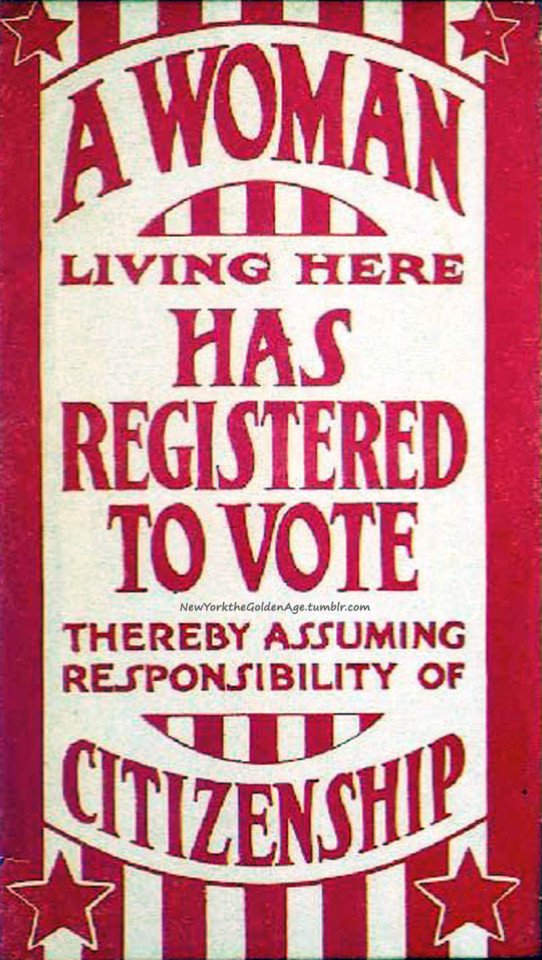
A window card from 1920, proclaiming that a newly-enfranchised woman had registered to vote.
Photo: NYC Municipal Archives
#vintage New York#1920s#19th Amendment#women's suffrage#female suffrage#poster#right to vote#voter registration#citizenship
967 notes
·
View notes
Text
Vivek Ramaswamy wants to end birthright citizenship—a longstanding American policy codified in the Fourteenth Amendment of the Constitution—and take away young people’s right to vote, all in one fell swoop.
The presidential candidate made the call Thursday night on CNN, after being asked about his opponents, Ron DeSantis and Donald Trump, vowing to end birthright citizenship. “For a period of time, I think it’s going to be necessary,” Ramaswamy said.
But the young gun was not satisfied just being in agreement with the leading duo in the Republican race-to-the-repressive-bottom.
“I’ll actually go one step further on this, Abby, is that I don’t think someone just because they’re born in this country, even if they’re a sixth generation American should automatically enjoy all the privileges of citizenship until they’ve actually earned it,” Ramaswamy told CNN’s Abby Phillip. “So one of the things I’ve said is that every high school student who graduates from high school should have to pass the same civics test that every immigrant has to pass in order to become a citizen of this country.”
Surveys in the past have shown that most people would likely fail a basic multiple choice citizenship test; one survey found just 36% of respondents actually passing such a test. And given Republicans’ all-out assault on public school education, it’s unclear what their plan would be to up those numbers.
After publishing, Ramaswamy senior adviser Tricia McLaughlin said the proposal refers “to civic duty voting via constitutional amendment.”
According to Ramaswamy’s website, this would mean raising the voting age to 25, while still generously “allowing all Americans to vote at age 18” only if they serve at least six months in the military or as a first responder, or pass the citizenship test.
Yet another successful pair of Republican talking points: seizing the right to vote from young people, and forcing people to join a military that has used trillions of American dollars to wreak carnage across the world, and leave its foot soldiers out to dry upon their return.
Anyhow, Ramaswamy’s brilliant proposal to seemingly strip citizenship from so many Americans came after Phillip noted that both of Ramaswamy’s parents are immigrants, and so birthright citizenship “was in play” for him when he became a citizen.
Yet, instead of making the citizenship process easier to navigate, Ramaswamy instead wants to make it harder for anyone to be a citizen. More than that, the presidential candidate’s formulation lays out tiers of citizenship—a matrix in which, until one passes this test, they would be a second-class citizen. While this country already treats scores of people—immigrants, LGBTQ people, laborers, the homeless, and young people—as such, Ramaswamy thinks that unfair treatment should be legally bound.
#us politics#news#the new republic#republicans#conservatives#2023#2024 presidential race#2024 presidential election#2024 elections#vivek ramaswamy#right to vote#voting age#raising the voting age#Citizenship#Birthright Citizenship#civics test#Citizenship test#tiers of citizenship#second class citizens
169 notes
·
View notes
Text
On this day, 105 years ago, after fighting for a long time, Polish women finally got the right to vote.
On November 28th 1918 the real democracy started in Poland 🇵🇱
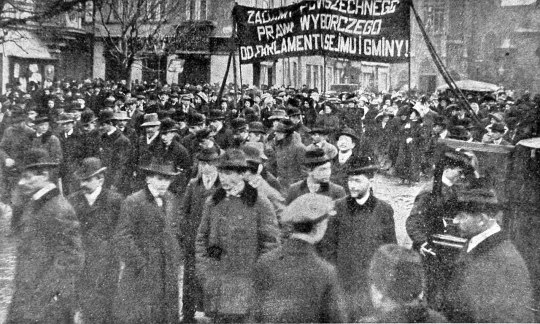
Polish suffragettes protesting in Kraków, 1911
#radfem#radical feminism#radfem safe#radblr#radfems do interact#feminism#radfems do touch#women's rights#women's liberation#adult human female#suffragettes#suffragette#women voters#right to vote#democracy#feminist#polish#poland#polish suffragettes#prawa kobiet#polska#1918#demokracja#prawa wyborcze#prawa wyborcze kobiet#polish history#polska historia#mine
34 notes
·
View notes
Text
58 notes
·
View notes
Text
🖤🖤🖤🖤🖤👏🏿👏🏿👏🏿 My people have been through to much. Still no reparations 😢😢

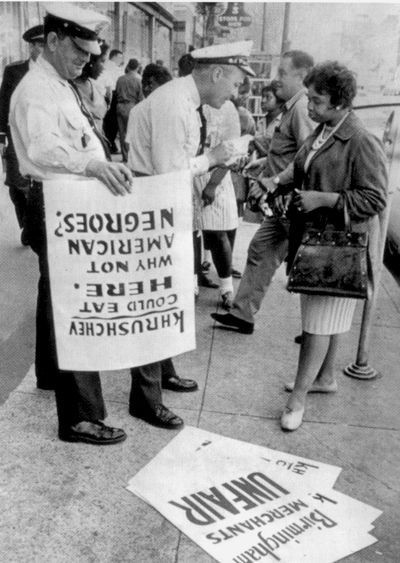




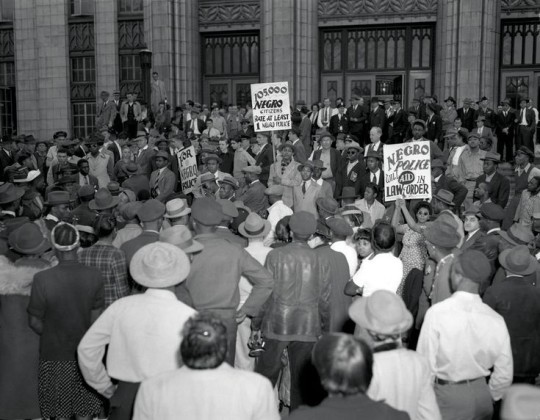



#black tumblr#black history#black history is american history#black literature#civil rights#black excellence#black community#civil rights movement#blackexcellence365#black girl magic#education#freedom#equal rights#black panther party#black and white#black archives#black culture#black pride#human rights#right to vote#reparations
276 notes
·
View notes
Text
I've occasionally posted old women's suffrage (and anti-suffragette) postcards, of which there were quite a few. There's a new (to me) online collection available that has some fascinating things.
19 notes
·
View notes
Text

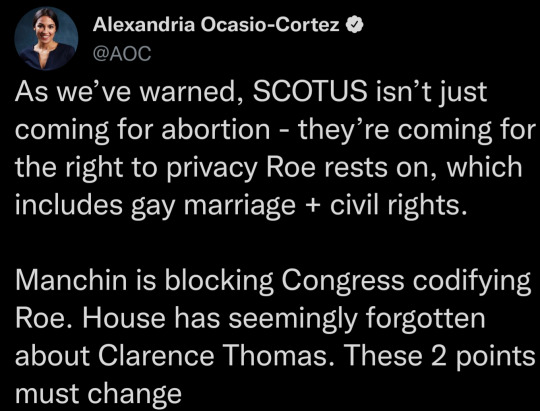
#us politics#twitter#tweet#rep. alexandria ocasio cortez#aoc#abortions#abortion ban#mark Joseph stern#us supreme court#scotus#2022#biden administration#gay marriage#civil rights#civil rights movement#segregation#women's rights#women's bodily autonomy#right to vote#equal rights#lgbtqia+ rights#the daily beast
611 notes
·
View notes
Text
They marched for desegregation — then they disappeared for 45 days : NPR

This photo of the group known as the Leesburg Stockade Stolen Girls was taken by Danny Lyons, a former SNCC photographer. It helped confirm the girls' location to their parents and civil rights activists. Danny Lyon/Magnum Photos hide caption
In the early 1960s, civil rights protests were picking up speed across the country. Sometimes, protest marches included children as young as 12 years old.
Usually, children who were arrested at protests were bailed out by activist groups, or eventually released to their parents. But on July 19, 1963, during a march to desegregate a theater in Americus, Ga., a group of Black girls was arrested — and for the rest of the summer, their parents had no idea where they were.
One of those girls was Lulu Westbrook-Griffin.
"We were gung-ho young people who want to change the system," Westbrook-Griffin told Radio Diaries.
Westbrook-Griffin was 12 years old at the time. Her older brother, nineteen-year-old James Westbrook, was a field secretary for the Student Nonviolent Coordinating Committee. With SNCC, Westbrook organized a march to desegregate the Martin Theatre, the only theater in Americus.
At least 40 people attended. But as the marchers approached the theater, local police demanded that they disperse, and began beating them with clubs and setting dogs on them.
"Some of us were taken by our feet and arms and thrown in a paddy wagon, and I was one of them," Westbrook-Griffin recalled.
Westbroook-Griffin's brother escaped arrest. "I told Mom that night: 'They drove her off in a paddy wagon and I have no idea where they went,'" James Westbrook said.
Along with at least 13 other girls, Westbrook-Griffin was transported to a single cell of the Leesburg Stockade — an abandoned, Civil-War-era building more than 20 miles away from Americus.
For the next 45 days, the girls would be subject to squalid living conditions. The stockade lacked running water, plumbing and beds. As the weeks passed, conditions only deteriorated.
"We were putting our waste in the shower drain because the toilet was overflowing," Westbrook-Griffin recalled.
Back in Americus, SNCC activists and parents were focused on locating the missing girls.
"Americus is a small town where everybody knew everybody," James Westbrook said. "It was a network of parents trying to find out, day by day, where their children were."
Throughout July and August, SNCC activists went from jail to jail in search of the missing girls. At one of SNCC's mass meetings, someone mentioned a rumor that the girls were being held in the old Leesburg Stockade.
Danny Lyon was a photographer for SNCC at the time. "James Foreman, who was executive secretary, said to go down and check it out," Lyon told Radio Diaries.
Lyon drove to the Leesburg Stockade after dark. There, he took clandestine pictures of the girls and their living conditions through bars of the building.
Lyon's photos confirmed the girls' location to parents and activists, providing leverage as they fought with authorities for the girls' return. Finally, on Sept. 1 – 45 days after they were taken – the police released the girls to their parents. Danny Lyon's photos appeared in Jet magazine in late September and in a special issue of SNCC's The Student Voice newspaper in 1964.
Westbrook-Griffin and the other girls were never formally charged after the march. They also weren't given a reason for why they were held in the stockade so long.
"Was it to break me? Was it to make me fearful? Was it to teach me a lesson?" Westbrook-Griffin says. She wonders to this day why the girls were kidnapped. "But when you look back at it now, you realize it pretty much was a badge of honor rather than a badge of disgrace. We were part of something that matters."
Lulu Westbook-Griffin and the other girls in the Leesburg Stockade were never formally charged. And local law enforcement never explained why they were held in the stockade for so long.
The stockade is still standing. In 2019, the state of Georgia put a historical marker on the site, acknowledging the incident. It reads, "Because their families were not initially told their location and the girls never faced formal charges, they became known as the Leesburg Stockade Stolen Girls."
#They marched for desegregation — then they disappeared for 45 days#stockade stolen girls of leesburg#leesburg georgia#georgia#white supremacy#right to vote#civil rights movement#kidnapped Black girls#leesburg stockage#sclc#sncc
30 notes
·
View notes
Text
Conservative influencer asks a question:
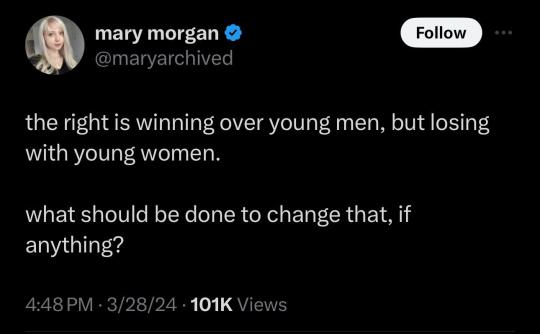

10 notes
·
View notes
Text
Happy International Women’s Day to all the amazing, strong, beautiful, smart, funny, awesome women out there.


#happy international women's day#international women’s day#anyway it’s 2024 and women still don’t have rights#fighting for bodily autonomy#fighting for a right to education#fighting to either choose not to wear a hijab or so they are allowed to wear one#right to vote#right to be seen#right to be heard#right to equal pay#trans women are women#we women gotta stick together#feminism#women#woman#free palestine#being a woman is cool#but also uterus suck#it’s okay to be feminine and it’s okay to not be feminine#it’s okay to like basic girly things#I am a basic bitch#just stop hating on each other#women life freedom
7 notes
·
View notes
Text
Ageism

Dr. Alex Powell (@/APowellLaw)
The idea that someone cannot make autonomous decisions about their own life below the age of 25 is a direct threat to the autonomy of all young people. What separates gender from access to abortion or the right to vote?
This is a very dangerous and harmful proposal.
Kay And Skittles (@/kayandskittles)
It’s significant that in a world where older generations have profoundly different political objectives (and far more political power) than younger people, we’re seeing this "think of the children" bs feeding seamlessly into "people under 25 are actually children".
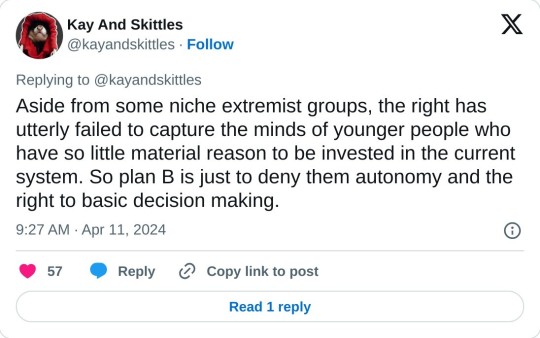
Aside from some niche extremist groups, the right has utterly failed to capture the minds of younger people who have so little material reason to be invested in the current system. So plan B is just to deny them autonomy and the right to basic decision making.

If it should become any kind of legal precedent that under 25’s can’t consent to medical procedures deemed to be non-essential, using a vulnerable marginalised group as a wedge to get the door open, what comes next?
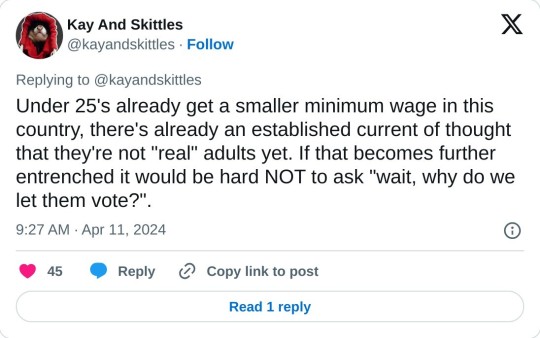
Under 25’s already get a smaller minimum wage in this country, there’s already an established current of thought that they’re not "real" adults yet. If that becomes further entrenched it would be hard NOT to ask "wait, why do we let them vote?".

And these legal structures will influence how people see themselves! We’ve already had a generation of young adults who won’t shut up about "adulting", imagine how infantilised they’d become if they were literally legally children at 24.
#i post#twitter#kayandskittles#kay and skittles#ageism#us politics#think of the children#infantilization#autonomy#trans#trans healthcare#abortion#reproductive rights#right to vote#suffrage#minimum wage#and#house ownership#housing#adulting#millenials#millenial falcon
3 notes
·
View notes
Text
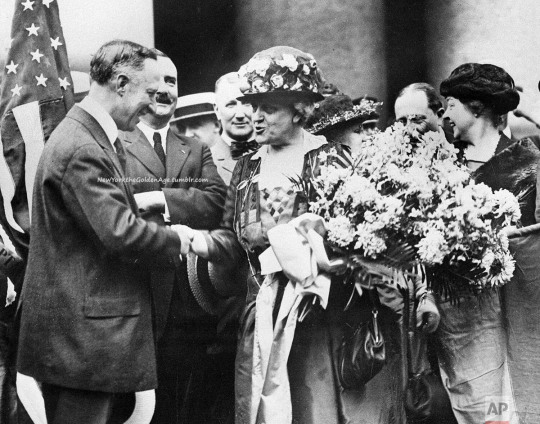
Former NY Governor Alfred E. Smith welcomes Carrie Chapman Catt, women's suffrage leader, on her triumphal return from Tennessee, August 27, 1920. Tennessee was the last state to ratify the 19th Amendment, giving women the right to vote. Miss Catt carries a bouquet of blue and yellow flowers, colors of the National American Woman's Suffrage Association.
Photo: Associated Press
#vintage New York#1920s#Carrie Chapman Catt#women's suffrage#19th Amendment#suffrage#suffragist#August 27#27 August#Al Smith#27 Aug.#Aug. 27#triumph#Constitutional amendment#right to vote
119 notes
·
View notes
Text
Just listened to a podcast on FranceInter about post WW2 feminism.
I've always believed that the right to vote in France, was given to women in 1944 as some kind of part of the package (l'État Providence/welfare state) De Gaulle and his government offered to provide relief to the people post WW2.
The podcoast gives two reasons for it that I didn't know. According to it, the right to vote was given to women:
1. As a reward to women who were part of the Resistance (even though there were very little resistants)
2. Because France was so fucking backwards in terms of women's rights compared to their occidental neighbours (other european countries + USA) that it would have been the only country among their little club where women couldn’t vote, and of course that would make us look bad.
But at zero point, it was because women were recognized or thought equals (despite them managing the country while men were at war).
So yeah, France is the country of men's rights. Men's. Not mankind. No matter how much every one insist that the "h" in front of Droits de l'homme is a capital letter, it's not.
Even in 2024, a female Prime Minister in France is a preposterous concept, meanwhile poorer countries we would call "backwards" have female leaders of states without losing their mind about it.
#rant#radical feminism#men vs women#feminism#france#french politics#french feminism#sexism#misogyny#women's rights#right to vote
3 notes
·
View notes
Text
How is this us supporting democracy:
Since Janna was born there has not been a single general or presidential election in the Palestinian territories. The last one took place in 2006, which means anyone under 34 years old has never had the opportunity to vote.
#palestine#israeli apartheid#palestinians#israeli occupation#illegal settlements#free palestine#youth#right to vote#democracy#elections#free and fair elections#civilrights#humanrights#electoralism#usa#future generations#young generation
16 notes
·
View notes
Link
61 notes
·
View notes
Text
Thirty years ago, a horseback riding incident left Milwaukee resident Martha Chambers paralyzed from the neck down. Her wheelchair gives her some independence: She drives it using her head and uses assistive devices known as mouth sticks to get other tasks done, like writing or using her laptop.
When it is election season, however, she is unable to get her ballot into a mailbox. She has relied on relatives, a caregiver, or a friend to physically place her ballot in one. Now, under a recent Wisconsin circuit court ruling mandating that only a voter, and not a designee, can submit an absentee ballot, it has effectively become illegal for Chambers to vote.
“Since I have had my disability, I have always voted absentee ... because the barriers to get to the voting polls in time can be very difficult for me,” she wrote in testimony used in court and compiled by the federally funded nonprofit Disability Rights Wisconsin.
Testimony from Chambers and other Wisconsin voters describing the painstaking effort they must make to cast a vote in their state helps paint a picture of how new ballot restrictions nationwide are presenting novel challenges for voters with disabilities. A concerted nationwide effort on the part of Republicans, including in Wisconsin, has sought to roll back voting expansions through shortening voting hours, limiting absentee and early voting, limiting dropbox availability, establishing additional voter ID requirements for mail-in voting, and more. All of these measures make it harder for people with disabilities to vote, voting rights activists and experts told Vox, and the efforts are already having an outsize effect.
According to the Centers for Disease Control and Prevention, 26 percent of American adults live with some type of disability; many have mobility issues or cognition difficulties, and have trouble living alone. Despite these challenges, people with disabilities made significant voter turnout gains in 2020, due in part to nationwide efforts to make it easier to vote during the pandemic. As many as 17.7 million people with disabilities (62 percent of all voters with disabilities) reported voting in the November 2020 general election, up from 16 million (56 percent) in the 2016 general election, according to data from the Program for Disability Research at Rutgers University and the US Election Assistance Commission.
Voting by mail increased during the pandemic for people with and without disabilities, but people with disabilities were more likely to use the option: Just over half of voters with disabilities voted by mail before Election Day, compared to 40 percent of voters without disabilities, according to the Rutgers research.
In Wisconsin, however, ballot assistance was banned for the state’s April 5 primary, overwhelming a voter hotline set up by the advocacy group Disability Rights Wisconsin with calls from voters questioning whether their ballots would be counted.
“These restrictions are problematic on so many levels, not only for people with disabilities but especially for people with disabilities, and there’s a lot at stake with our next election coming up in August,” said Barbara Beckert, the director of external advocacy for southeastern Wisconsin for Disability Rights Wisconsin, which staffs the hotline and informs voters with disabilities of their rights, and audits polling locations.
In Wisconsin, a bipartisan effort to distribute more than 500 drop boxes as a secure way to cast absentee ballots also led to high voter turnout — more than 72 percent of the state’s voting-age population voted — for the 2020 general election. In June 2021, two voters, backed by the conservative group Wisconsin Institute for Law and Liberty, sued the Wisconsin Elections Commission in Teigen v. Wisconsin Elections Commission, challenging the legality of drop boxes for absentee voting. The plaintiffs asked the court to ban drop boxes across the state and require voters to mail or return their own ballots directly to clerks. Under their interpretation of the Wisconsin statute that concerns absentee ballots, a voter must physically mail or deliver only their own ballot, and not that of someone else.
The voters who filed the lawsuit cited a fear of “ballot harvesting,” a term linked to vote-by-mail conspiracy theories that conservatives use to describe ballot collection and submission by a person or organization on behalf of voters. It is illegal to ballot harvest or “ballot traffic” in states such as Georgia and Arizona; in January, a conservative state judge sided with the Wisconsin plaintiffs, blocked the use of drop boxes, and prohibited people from returning ballots on behalf of someone else in Wisconsin, too.
Despite appeals by organizations including Disability Rights Wisconsin, the state Supreme Court eventually upheld the lower court’s decision, allowing the prohibitions to take effect for the April 5 election. A final ruling in the case is expected in June, and the outcome could affect two important August primary races: Democratic Gov. Tony Evers and Republican Sen. Ron Johnson are both seeking reelection.
“2020 was probably the most accessible election we’ve seen,” said Michelle Bishop, the voter access and engagement manager at National Disability Rights Network. “We made a lot of changes in response to Covid, which also happened to be best practices for making voting more accessible for people with disabilities. But we are still in the period of pushback to all of those positive changes.”
Wisconsin is not the only state that has implemented new restrictions that make it particularly difficult for voters with disabilities to access the ballot and cast a vote.
During its March primary, Texas rejected nearly 23,000 mail-in ballots, or about 13 percent of ballots cast, according to an Associated Press investigation, an unusually high number considering that the number of rejected ballots during a general election typically doesn’t surpass 2 percent. Most of the ballots were rejected on the grounds that the voters failed to meet identification requirements established under Texas’s new voting law. The law requires that voters provide their driver’s license number or the last four digits of their Social Security number when applying for a mail-in ballot, and write that same number on the ballot when sending it in. Democrats have argued that the new ID requirement simply makes it harder to vote, and disability rights activists point out how the requirement has already affected voters with disabilities.
Florida and Georgia have adopted similar bills that impose restrictions on mail-in voting. More states may join the effort. According to the Brennan Center, a liberal nonprofit law and and public policy institute, at least 18 bills in five states would require voters to provide their driver’s license number, Social Security number, or voter record number when applying for a mail-in ballot. One Arizona bill would essentially create the same effect as the Wisconsin ban, requiring voters to present an ID when returning a mail-in ballot. The ID would need to be that of the person turning in the ballot.
“We are looking at a number of states that are putting restrictions on ballot drop boxes, rolling back curbside voting, preventing the passing out of food and water in lines, adding new ID requirements, shortening timelines for submitting and requesting mail-in ballots, and restricting who can drop off a ballot,” said Sarah Blahovec, the voting and civic engagement director at the National Council on Independent Living. “These changes give people with disabilities fewer options, which then compounds with other issues as well. There are disabled people in poor and minority communities who are impacted even more than if you consider it just from a disability perspective and don’t consider these other factors.”
At every turn, people with disabilities face barriers that make it harder to vote. They may not have access to transportation, they may have difficulty getting out into their communities because of a health condition, or their polling places may not be accessible. Many people with disabilities are non-drivers.
In Wisconsin, 30 percent of the population are non-drivers, which means they often don’t have a driver’s license, and the state does not have automatic voter registration. For those for whom transportation is not a barrier, they must navigate the limited hours of the Division of Motor Vehicles, which is one place they register to vote. If a voter lives in a rural area, it might take them 45 minutes in each direction to get to a DMV that is only open during the day. While Medicaid covers transportation for medical appointments, it doesn’t cover visits to the DMV. Then, multiple documents, such as birth certificates and Social Security cards, are required to begin the process of getting an ID.
“This is a huge problem for people with disabilities who may be living in a group home or in an environment where they don’t have a lot of control over their lives,” Beckert said. They may not have control or even possession of their documents.
Voters who identify as “indefinitely confined,” an official designation recognized by the state, have also been threatened by Republicans’ wish to change these voters’ entitlements. Because of disability, age, physical illness, or other infirmity, these voters always need to vote absentee. This group is sizable in Wisconsin, because the state has many more people with significant disabilities (those with severe cognitive or physical impairment that limits their ability to function independently)living in the community instead of in assisted living facilities. Because they typically vote absentee and are not drivers, Wisconsin lawmakers determined they don’t need to provide a photo ID to vote. But challenges to Wisconsin’s laws, like Republicans’ SB 204 bill, introduced in the state Senate last year, allege that this allowance leaves the door open to fraud.
Similarly, conservative operatives were outraged that people in assisted living facilities were automatically mailed ballots during the pandemic without the supervision of a special voting deputy, who would have overseen the process. The pandemic prevented these supervisors from visiting such facilities. Operatives have contended that the people in assisted living should not have been sent ballots without supervision due to the alleged potential for fraud. “It’s discriminatory to suggest that because someone lives in a nursing home or because they have some kind of cognitive loss, they can’t vote. That is not what Wisconsin law says,” Beckert said.
Like other activists across the country who are fighting restrictive new voting laws in court, Wisconsin activists who appealed the lower court’s ruling have argued that the restrictions violate federally protected rights. For example, the right to request that someone else return an absentee ballot is protected by Section 208 of the Voting Rights Act, and the Americans with Disabilities Act states that “no qualified individual with a disability shall, by reason of such disability, be excluded from participation in or be denied the benefits of the services, programs, or activities of a public entity, or be subject to discrimination by any such entity.” That language makes bans on drop boxes or voter assistance illegal, activists say. But winning on these grounds in court will take time as lawsuits work their way through judicial hoops.
The voting rights long game
While the right to vote is under siege, disability rights activists say they’re focused on thinking about creative solutions for expanding access to the ballot box even when their outlook on the present is bleak. Speaking out about policy recommendations — and not just about the many challenges that voters face — is key, activists told Vox.
“After 2020, we thought we’d be spending so much more of our time promoting policies to make our elections more accessible and inclusive,” Beckert said. “People with disabilities have historically faced a lot of barriers to exercising their right to vote, but things moved in a direction that we didn’t anticipate, so we’d like to get a chance to put our recommendations out there.”
Beckert’s list of policy recommendations is long, and touches several categories, including how to effectively train election administrators to support voters with disabilities, loosening voter ID requirements, improving transportation options and accessibility at polling locations — ideas that may already be in effect in other states.
Because Wisconsin’s elections are decentralized, the training that’s provided to poll workers varies, with many of them unfamiliar with the rights and accommodations that voters with disabilities are entitled to, Beckert told Vox. For example, voters with disabilities are entitled to having an assister complete their ballot, and to using an accessible voting machine and curbside voting.
On a national scale, activists have also been advocating for automatic voter registration, which could enhance the accuracy of voter registration rolls by reducing the number of voters who have to update their voter registration with clerks or at their polling location on Election Day. In the same vein, activists reject any push that would ask election clerks to match a driver’s license signature with a voter’s signature during registration or the absentee voting process. According to Beckert, many disabilities can lead people to change their signature over time. Voters with disabilities might also use electronic equipment that could inadvertently alter their signature.
At the National Council on Independent Living, Blahovec also has policy recommendations, which are an even broader attempt to help national lawmakers recognize how commonly accepted voting practices limit voters with disabilities. The Freedom to Vote Act, Democrats’ landmark voting legislation that was defeated in January, would have mandated paper ballots. The mandate would have pleased election security advocates, but would have disenfranchised voters who are blind or have low vision or other print-related disabilities.
“The disability community has pushed for a carve-out and for accessible fully electronic systems but have been unable to get that into the legislation,” Blahovec said. Another major problem with systemic inaccessibility is that efforts to improve accessibility are just not funded, Blahovec said. The Accessible Voting Act, which was introduced and stalled in the House in 2021, would have given states grants to improve accessibility to voting. “When accessibility isn’t funded, people with disabilities are left behind, and states don’t even have the resources to fix the issues,” Blahovec said.
Voting rights are about the long game, activists told Vox. “As a country, we are moving in the right direction, and I try to keep that in mind in the moments when there is pushback to progress,” said Bishop, of the National Disability Rights Network. “These aren’t battles that we are all going to win today.”
#article#excerpt#full article under the cut#disability justice#vote#right to vote#voting restriction#ableism#discrimination#us politics
114 notes
·
View notes